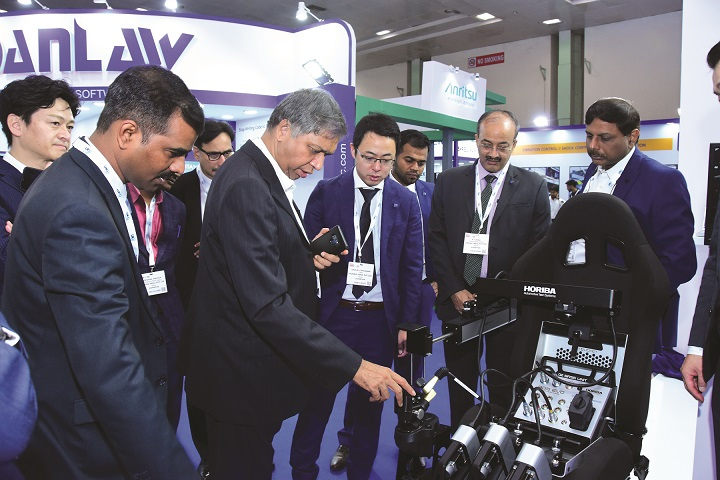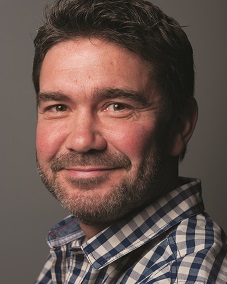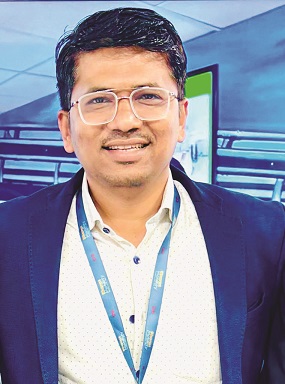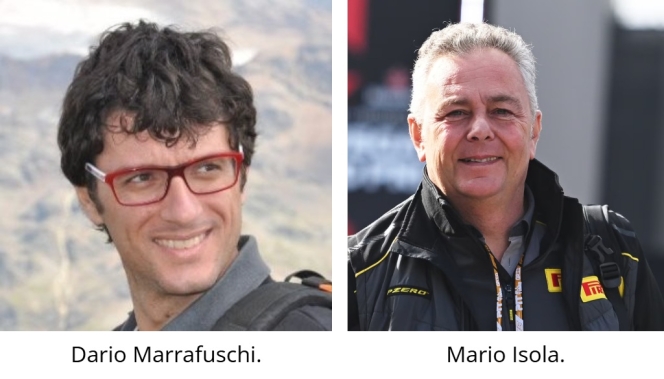- Auto Test
- Dominic Cundy
- Automotive Testing Expos
- Sagar Bendra
- NATRAX
- National Automotive Test Tracks
India Speeds Up Auto Testing To Meet Global Standards
- By TT News
- March 06, 2025

India’s automotive testing sector is dramatically transforming as it races to bridge the gap with global standards while confronting distinctive local challenges. In an extensive interview with Tyre Trends, two industry leaders discuss how India is navigating this critical transition period in its automotive evolution.
Dominic Cundy, Managing Director of Automotive Testing Expos at UKi Media & Events, and Sagar Bendre, Head of Crash Barrier Testing at NATRAX (National Automotive Test Tracks), provide detailed insights into the current state and future trajectory of India’s automotive testing landscape.
UNIQUE CHALLENGES
India’s diverse and extreme climate creates unique testing requirements that set it apart from other major automotive markets. “India’s extreme weather variations, including high temperatures, monsoons and dust-heavy environments, and a wide range of road quality require testing protocols tailored to these unique challenges. OEMs do develop a vehicle considering all these conditions,” Bendre explains.
The pressure to maintain affordability while meeting increasingly stringent standards presents another layer of complexity. “The Indian market’s focus on affordable vehicles puts pressure on manufacturers to minimise testing costs while maintaining compliance with stringent safety and emission standards,” says Bendre.
This balancing act between cost and compliance has become increasingly challenging as India adopts stricter safety and emissions standards.

The gap between India’s testing capabilities and those of other major automotive nations stems from multiple factors. Bendre notes that specialised facilities for advanced testing remain limited compared to developed markets. “India lacks sufficient facilities for advanced crash testing, real driving emissions (RDE), EV battery safety and autonomous vehicle testing, which are more established in developed countries,” reveals Bendre.
This infrastructure gap has historical roots. “India’s focus on automotive testing infrastructure began relatively recently compared to countries like Germany, US and Japan, which have decades of advanced R&D and testing experience,” Bendre explains. The rapid pace of regulatory changes has further complicated the situation as testing facilities struggle to meet new requirements.
MARKET EVOLUTION AND INDUSTRY RESPONSE
The growth of India’s automotive testing sector is reflected in the expanding scope of industry events such as the Automotive Testing Expo India. Cundy provides perspective on this evolution: “When the show (Automotive Testing Expo India) was first launched in 2010, it attracted 72 exhibitors and 2,173 visitors. This contrasts with the 2023 figures, with 153 exhibitors and 5,138 visitors.”
 This growth reflects not just increased market size but also growing technological sophistication. To maintain relevance, industry events have had to evolve rapidly. “We maintain constant communication with suppliers to learn about their latest offerings and innovations and encourage exhibitors to prioritise showcasing their newest products during the event. We also partner with industry leaders, influencers and innovators in the region,” Cundy explains.
This growth reflects not just increased market size but also growing technological sophistication. To maintain relevance, industry events have had to evolve rapidly. “We maintain constant communication with suppliers to learn about their latest offerings and innovations and encourage exhibitors to prioritise showcasing their newest products during the event. We also partner with industry leaders, influencers and innovators in the region,” Cundy explains.
The Automotive Testing Expo India organiser partners with startups and emerging brands, which are typically at the cutting edge of innovation and offer the latest products. In addition, their knowledge partner, ARAI, offers valuable insights into the current market demands and challenges.
ELECTRIC VEHICLE IMPACT
The transition to electric vehicles is driving significant changes in testing requirements. Bendre outlines how testing facilities are adapting to this shift, noting increased emphasis on battery safety, thermal management and charging infrastructure compatibility.
Major manufacturers are making significant moves in this space. Cundy highlights recent developments: “Mahindra’s EV initiative includes launching five new EVs on a new platform called INGLO. They are partnering with VW, which is supplying components. Skoda is currently undertaking a big initiative in India, which includes the development of new vehicles in the country.”
SAFETY STANDARDS AND TESTING EVOLUTION
Road safety remains a critical concern driving testing requirements. “There is a big push in India to improve road safety, with Bharat NCAP 2023 launching, because there are still high numbers of road deaths despite advances in technology,” Cundy notes. The limited availability of crash testing facilities has historically forced manufacturers to send vehicles abroad for testing, adding time and expense to the development process.
GOVERNMENT INITIATIVES AND FUTURE DEVELOPMENT
 Government support is crucial in advancing testing capabilities. “Government initiatives like the NATRAX project and private investments will enhance the availability of state-of-the-art testing facilities across the country. NATRAX is developing all future testing, such as ADAS, EV performance, road safety furniture, crash barriers, crash cushions etc.,” Bendre explains.
Government support is crucial in advancing testing capabilities. “Government initiatives like the NATRAX project and private investments will enhance the availability of state-of-the-art testing facilities across the country. NATRAX is developing all future testing, such as ADAS, EV performance, road safety furniture, crash barriers, crash cushions etc.,” Bendre explains.
The implementation of new regulations is driving further development. Bendre points to the implementation of Bharat Stage VI (BS6) and upcoming updates like BS6.2 as key factors increasing demand for sophisticated emissions testing capabilities.
TECHNOLOGY INTEGRATION
The industry is increasingly embracing digital solutions to enhance testing efficiency. “The use of digital twins, simulation tools and AI-driven predictive testing is reducing time and costs for physical prototypes,” Bendre notes. This technological integration is helping bridge the gap between testing requirements and available physical infrastructure.
A critical challenge facing the sector is the shortage of skilled professionals. “A shortage of skilled professionals trained in advanced testing methodologies, particularly for EVs and connected vehicles, hinders the growth of India’s testing ecosystem,” Bendre acknowledges. However, he sees this changing through partnerships with global testing agencies and investments in workforce training, which will help bridge expertise gaps and elevate India’s standing as a global automotive testing hub.
KraussMaffei Technologies Appoints Dirk Musser As New Managing Director
- By TT News
- February 27, 2026

KraussMaffei Group is set to implement a leadership transition at its subsidiary, KraussMaffei Technologies, with a change at the board level. Jörg Stech, who has served as Chairman of the Board and global head of injection moulding, automation and additive manufacturing since 2023, will be departing on 31 March 2026 at his own request. He will be succeeded by Dirk Musser, the current Head of Group Transformation at the parent company, who has been appointed as the new Managing Director effective 1 April 2026. The leadership handover between Stech and Musser is already in progress, ensuring a seamless transition.
Stech’s tenure unfolded during a difficult economic period marked by financial losses and a contracting market. He responded with decisive measures aimed at margin enhancement and balance sheet improvement, which laid the groundwork for the company's long-term stability. Under his direction, the product lineup for injection moulding and automation was revitalised with the introduction of the LRXplus linear robot, the fully electric PX series and the MC7 control system, all launched in late 2025 alongside new artificial intelligence tools. He also launched a multi-year development initiative and pushed the company into new markets, such as aerospace and drone technology, by leveraging expertise in specialised processes like ColorForm. Through a focus on operational excellence, pricing discipline and capital efficiency, Stech guided the company to a significantly more resilient position compared to three years prior, despite the persistent downturn in injection moulding.
Musser brings to his new role extensive experience in transformation and finance. In his current capacity, he has already been closely involved with KraussMaffei Technologies, collaborating with its leadership to drive strategic initiatives and enhance operational performance. His qualifications include sharp analytical abilities, a strong grasp of industrial processes and a broad international perspective. An economist by training, Musser has accumulated over 20 years of leadership experience across various technology and industrial sectors. His background includes leading major transformation and turnaround projects at CRRC New Material Technologies, where he stabilised plant earnings in North America, as well as directing operational and financial restructurings during his time at Deloitte. He has also held roles with P&L responsibility, managing global supply chains and post-merger integrations at CRONIMET and has prior experience with automotive manufacturers including Daimler and Fujian Benz Automotive in China.
Alex Li, CEO, KraussMaffei Group, said, "Jörg Stech took on responsibility in a difficult situation, set clear priorities and launched decisive initiatives. The successful market launch of the LRXplus linear robot and the all-electric PX machine series, the consistent focus on profitability and the sustainable strengthening of our balance sheet are visible results of this work. We would like to express our sincere thanks to Jörg Stech for his leadership, integrity and team spirit. We value Dirk Musser as a leader who combines strategic clarity with operational excellence. In a short period of time, he has provided vital impetus for the transformation of the group and impresses with his analytical strength, decisiveness and deep understanding of our processes – not least through his successful collaboration with the managing directors of KraussMaffei Technologies. We are convinced that he will continue on this path with clarity and creative drive to successfully align KraussMaffei Technologies."
Stech said, "After many years in an environment full of technological, economic and geopolitical challenges, I look back with great gratitude on a time in which I was always surrounded by an exceptional workforce. Together, we achieved things that many initially thought were impossible. This cooperation, this willingness to push boundaries and create something new, was a joy for me. My special thanks go to all stakeholders in the company and, of course, to all employees. I leave with respect, gratitude and the conviction that this long-established company will continue to achieve great things in the future."
Musser said, "Together with my fellow managing directors Dr Frank Szimmat and Markus Bauer, I want to resolutely drive forward the further development of KraussMaffei Technologies. Our focus is on further expanding stability and performance and taking the necessary steps to successfully position the company in a dynamic market environment. I look forward to shaping this path together with our teams.”
Dario Marrafuschi Succeeds Mario Isola As Pirelli’s Head Of Motorsport
- By TT News
- February 27, 2026

Italian tyre manufacturer Pirelli has announced that Dario Marrafuschi will become the Head of its Motorsport Business Unit, effective 1 March. He succeeds Mario Isola, who will remain with the company until 1 July to assist with the leadership transition.
Marrafuschi joined Pirelli in 2008 and has held positions within the Formula 1 Research and Development department. Most recently, he led the development of the company's road products.
He will report to Giovanni Tronchetti Provera, Executive Vice-President of Sustainability, New Mobility & Motorsport. The appointment comes as the company continues its role as the tyre supplier for various global motorsport categories.
Isola departs the company following a tenure that included the expansion of Pirelli’s motorsport operations. The company stated that Isola will pursue other professional opportunities following his departure in July.
Changing Tyre Dynamics In A Changing Car Market
- By Sharad Matade
- February 27, 2026
For Continental Tires India, the passenger vehicle market in India is entering a phase where scale and structure are finally aligning with its longstanding premium ambitions. Passenger vehicle sales reached a record 4.3 million units in 2024, expanding by 4–5 percent year on year, but it is the composition of that growth – rather than the headline volume – that is reshaping the company’s strategy. Utility vehicles now account for approximately 58 percent of total passenger vehicle sales, up sharply from about 51 percent the previous year, cementing SUVs and crossovers as the dominant force in the market.
This structural shift has direct consequences for tyre manufacturers operating at the upper end of the value spectrum. Larger vehicles bring higher kerb weights, bigger wheel diameters and greater expectations around refinement, safety and performance. For Continental, the change represents not merely an increase in addressable demand but a decisive move towards tyre categories where technology differentiation and pricing discipline can coexist.
Samir Gupta, Managing Director of Continental Tires India, calls this phase a turning point, not a temporary high. He says the surge in utility vehicles – driven by electrification and more premium cars – fundamentally changes the economics of the passenger tyre market in India.
“Let me clarify one thing first. The utility vehicle segment is no longer small. Last year, around 60 percent of passenger vehicles sold in India were utility vehicles, and including first-time buyers upgrading within this segment, the share goes beyond 65 percent,” Gupta says.

Industry data broadly supports this assessment. SUVs alone contributed close to three-fifths of all passenger vehicle sales in 2024, with compact utility vehicles accounting for a significant share of incremental volumes. The overall passenger vehicle market, at around 4.3 million units, has thus become structurally skewed towards larger formats – an inflection with long-term implications for tyre sizing, load ratings and product mix.
This shift shows in replacement demand. As vehicle footprints grow, rim diameters are increasing. “The market is clearly moving from smaller to bigger rim sizes. Demand for 17-inch and above tyres is rising sharply,” Gupta says. While these tyres are still a minority, their growth far outpaces the overall passenger tyre market.
Electrification is accelerating the shift. A substantial proportion of electric passenger vehicles sold in India today are SUVs, and Continental expects EVs to account for more than 50 percent of the passenger vehicle segment within five years. For tyre manufacturers, this creates new technical requirements – higher torque tolerance, lower rolling resistance and stringent noise control. “That creates a significant opportunity for us because our strengths lie in premium, high-performance tyres,” Gupta says.

Despite these favourable structural trends, premium tyres have historically struggled to gain traction in India. For much of the past decade, the market remained intensely price-sensitive, with tyres treated largely as commoditised replacement items. Continental’s response, Gupta explains, has been consistent rather than tactical pricing. “Right from the beginning, we have focused on fair pricing. The idea is simple – if we can clearly differentiate on performance and consistently deliver on those promises, price recovery will follow,” he explains.
The broader environment is now becoming more supportive. As vehicle prices rise and consumers migrate towards larger, more sophisticated vehicles, willingness to spend on tyres that enhance safety, comfort and driving confidence is increasing. This trend is also evident at the top end of the market. Premium and luxury passenger vehicle sales reached approximately 51,500 units in 2024, up around 6 percent year on year and crossing the 50,000-unit threshold for the first time – a symbolic marker of premium consumption in India.
Gupta sees premiumisation extending beyond luxury vehicles. “Earlier, India was extremely price-sensitive, but that is changing in higher segments. Consumers are upgrading vehicles and are more willing to invest in tyres that enhance safety, comfort and confidence,” he says.
The intensification of competition, with global premium tyre brands expanding or re-entering India, is viewed as a positive development. “Competition is always good,” Gupta says. “It gives you room to grow and improve.” More importantly, he believes it will help reframe the market. “More premium players will help move the market away from being purely cost-driven to being value-driven,” he adds.
Replacement market dynamics reinforce this view. Of the roughly 32–33 million passenger tyres replaced annually in India, tyres sized 17 inches and above account for about 12–13 percent. While the overall replacement market grows at 5–6 percent per year, this high-diameter segment is expanding at over 20 percent annually, closely tracking the shift in new vehicle sales.
This sharper focus on passenger tyres also explains Continental’s decision to exit the truck and bus radial segment in India. Gupta stresses that the decision was strategic rather than operational. Continental entered the TBR market in 2014, invested significantly and received strong feedback on product performance.
However, the economics proved limiting. Gupta says, “TBR in India is largely a B2B, fit-for-purpose market. Even if you have the best tyre, willingness to pay remains limited because fleet operators are under constant margin pressure.” Although commercial tyres offer higher absolute margins per unit, they consume substantially more raw material. “One commercial tyre uses six to eight times the raw material of a car tyre. Percentage margins are actually higher in passenger tyres,” Gupta explains.
After reviewing its portfolio, Continental chose focus over breadth. Exiting TBR allows the company to concentrate capital, technology and management attention on passenger and light truck tyres, where differentiation is more readily monetised. Gupta rejects the idea that a narrower portfolio weakens the company’s position. Commercial and passenger tyre customers, he argues, are fundamentally different – one driven by procurement economics, the other by consumer perception and emotion.
Indian consumers, Gupta believes, are becoming more tyre-aware. “Premiumisation is happening across the vehicle industry, not just in tyres. As consumers move to larger and more premium cars, their expectations also rise,” he says. Where tyres were once treated as an afterthought, buyers increasingly recognise their role in braking, grip, noise and overall driving confidence.
This change is evident at the retail level. Continental now operates more than 200 brand stores across India, and feedback from retail partners suggests customers are more informed and more demanding. Availability remains critical. “There is no point launching premium tyres if customers cannot find them,” Gupta says.
To support future demand, Continental is investing around INR 1 billion at its Modipuram plant, with the focus squarely on passenger and light truck tyres. The expansion will extend manufacturing capability from the current 20-inch limit to 22–23 inches, aligning local production with emerging vehicle trends.
Localisation, Gupta argues, is about adaptation rather than compromise. Indian road conditions, climate and driving habits require specific tuning without diluting global performance standards. Education and availability remain the principal challenges.

The recent launch of the CrossContact A/T² in India reflects this strategy. Introduced during Continental’s Track Day at Dot Goa 4x4, the product positions India among the early global markets for the tyre. “The first thing you notice is noise – or the lack of it,” Gupta says. “You hear the air-conditioning, not the tyre.” Ride comfort, grip and consistency across terrains define its appeal. As Gupta puts it, “Jahan tak soch jaati hai, wahan tak yeh tyre kaam karta hai.”
Looking ahead, Continental remains largely insulated from shifts in original equipment strategies, such as the gradual removal of spare tyres. Improved carcass design and stronger sidewalls are reducing puncture risk, but the company’s primary focus remains the replacement market.
For Gupta, the question is no longer whether India is ready for premium tyres, but how effectively manufacturers execute. “The market is finally ready for premium tyres,” he concludes. With passenger vehicle sales at record levels, SUVs firmly dominant and premium consumption expanding, Continental believes it is well positioned to grow alongside India’s evolving mobility landscape.
Falken Tyre Europe GmbH Rebrands As DUNLOP Tyre Europe GmbH
- By TT News
- February 26, 2026

Falken Tyre Europe GmbH has officially transitioned to operating under the name DUNLOP Tyre Europe GmbH, following its formal registration with the Offenbach Local Court. This change signifies a pivotal development for the Sumitomo Rubber Industries subsidiary. The rebranding represents a calculated and essential move to establish a more formidable European footprint for the DUNLOP brand. Company leadership acknowledges that this evolution is built upon the considerable equity established by Falken, including its strong market recognition, unwavering product quality and the commitment of its personnel.
This strategic shift positions the organisation under the umbrella of a globally respected marque, with its future strategy firmly centred on expansion, pioneering advancements and ecological responsibility. A prominent symbol of this new chapter will be unveiled shortly, with the renaming of the DUNLOP City Tower in Offenbach. A formal ceremony will mark the occasion, featuring the presentation of the DUNLOP logo at the tower. The event is set to be attended by Offenbach's Lord Mayor, Dr Felix Schwenke, alongside the company’s managing directors, Hiroshi Hamada and Markus Bögner, and the newly enlarged DUNLOP team.
Markus Bögner, Managing Director and President, DUNLOP Tyre Europe GmbH, said, “The name change is an important milestone of which we can be very proud. It strengthens our identity and underlines that we are ready for the next steps. Our strong heritage with Falken is and remains part of our success, laying the foundations for DUNLOP’s future in Europe. Our thanks go to all our employees and partners who have supported and accompanied us on this journey.”







Comments (0)
ADD COMMENT